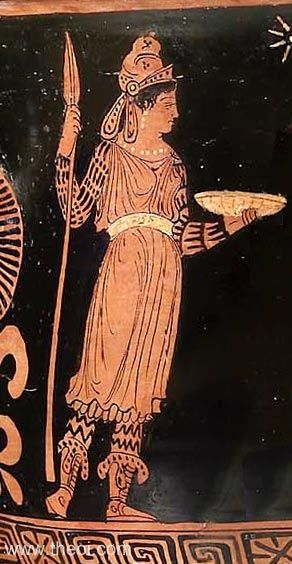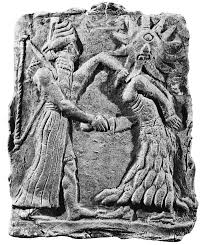Understanding the ancient world is quite a job, just remark that: Greeks and Romans are the easiest to understand when we start to watch the other civilizations (Egyptians, Mesopotamians, Persians) we are definitely in alien territory, so keep that in mind.
The Greeks were naming themselves "Hellen" and those who were not speaking Greek "Barbarians", so yes, Persians were barbarians and Egyptians were barbarians. This is something you find in Egypt, "the world" and the rest of the world. Persians were making a huge difference between Persians / Medes and other civilization. Sumerians were calling themselves "the black people", etc.
Herodotus 2.50
The good old Herodotus in chapter 2.50 of the History tells us about the Egyptian origin of the Greek gods, this passage has to be cited completely:
σχεδὸν δὲ καὶ πάντων τὰ οὐνόματα τῶν θεῶν ἐξ Αἰγύπτου ἐλήλυθε ἐς τὴν
Ἑλλάδα. διότι μὲν γὰρ ἐκ τῶν βαρβάρων ἥκει, πυνθανόμενος οὕτω εὑρίσκω ἐόν· δοκέω δ᾽ ὦν μάλιστα ἀπ᾽ Αἰγύπτου ἀπῖχθαι. ὅτι γὰρ δὴ μὴ Ποσειδέωνος καὶ Διοσκούρων, ὡς καὶ πρότερόν μοι ταῦτα εἴρηται, καὶ Ἥρης καὶ Ἱστίης καὶ Θέμιος καὶ Χαρίτων καὶ Νηρηίδων, τῶν ἄλλων θεῶν Αἰγυπτίοισι αἰεί κοτε τὰ οὐνόματα ἐστὶ ἐν τῇ χώρῃ. λέγω δὲ τὰ λέγουσι αὐτοὶ Αἰγύπτιοι. τῶν δὲ οὔ φασι θεῶν γινώσκειν τὰ οὐνόματα, οὗτοι δέ μοι δοκέουσι ὑπὸ Πελασγῶν ὀνομασθῆναι, πλὴν Ποσειδέωνος· τοῦτον δὲ τὸν θεὸν παρὰ Λιβύων ἐπύθοντο· οὐδαμοὶ γὰρ ἀπ᾽ ἀρχῆς Ποσειδέωνος οὔνομα ἔκτηνται εἰ μὴ Λίβυες καὶ τιμῶσι τὸν θεὸν τοῦτον αἰεί. νομίζουσι δ᾽ ὦν Αἰγύπτιοι οὐδ᾽ ἥρωσι οὐδέν.
English translation:
By making inquiries, I discovered that the names of the gods came to Hellas from barbarians; and I myself concluded that they derive specifically from Egypt, for 1 the names of the gods have been known in Egypt since the earliest times, except for Poseidon and the Dioskouroi (as I mentioned earlier); as well as Hera, Histia, Themis, the Graces, and the Nereids. Here I am reporting what the Egyptians themselves say, and this leads me to believe that the gods whose names they deny knowing were named by the Pelasgiansb- all except for Poseidon, since this god was introduced to the Hellenes by the Libyans, who alone, among all peoples, have always honored him and have possessed the name of Poseidon from the beginning. And as to the Dioskouroi, the Egyptians do not believe in heroes at all.
Notice also, and this is constant in Herodotus, that almost all gods of other countries are given Greek names, here, for example, the Libyans are related to Poseidon.
Some other points here showing the relation:
2.41 Their statue of Isis has a woman's body with horns like a cow's, just as the Hellenes portray Io
2.42 And since the Egyptians call Zeus by the name of Ammon, it seems to me that the Ammonians also received their name from the appellation of this god.
2.43 Moreover, the fact is that the Egyptians did not take the "name of Herakles" from the Hellenes, but that the Hellenes (that is, those Hellenes who established the name of Herakles as the son of Amphitryona) took it from the Egyptians; this can be demonstrated by many proofs, especially by the fact that both parents of Herakles, Amphitryon and Alkmene, were of Egyptian descent
NB: Herakles parents are descendants of Perseus which was a descendant of Aigyptos [Αἴγυπτος = Egypt in Greek].
Foreign Greek god
We have a very clear example of a Thracian Goddess (Bendis) included in the Athenian pantheon during the war of the Peloponnese:

Here are Richard Farnell notes of her:
The Thracian Bendis was probably in origin and character the same as the great mother of Phrygia and was worshipped (...) with the same orgiastic rites(...) we also hear of Bendis as the great goddess of Lemnos to whom human victims were offered... The reasons for this association of the greek maidenly goddess with the Bendis-Hekate-Brimo the patroness of savage magic and terrifying superstition may have been some external resemblance of attributes, but also probably, some consanguinity of character. Like Artemis, the Thracian divinity was supposed to ride on bulls; like Artemis, she was a mighty huntress, though her weapon was not the bow, but the spear in each hand.
So basically we see that Bendis was included in the Athenian pantheon of Gods roughly for political reasons namely the alliance with the Thracians. As a Goddess of hunt, dark ritual magic and bulls, Bendis was linked naturally to Hecate - Artemis (note the theme of the moon). Notice that what Plato is talking about, the fact the Athenians were riding with torches in their hands is purely an Artemis ritual.
You can read more on that here where I gave a more complete historical account.
External mythological elements
I can also add that Greeks did happily borrow elements in other mythologies, especially in Mesopotamia.
Here is, for example, Odysseus killing the Cyclops, I meant Nergal killing Igidalu or Igidaru:

The borrowing of the Greeks there is quite extensive... Here is, for example, the start of the Hittite song of Kummarbi, that you can parallel with Hesiod's Theogony:
For a mere nine years Alalu was king in heaven. In the ninth year, Anu gave battle against Alalu and he defeated Alalu. He (Alalu) fled before him and went down to the Dark Earth. Down he went to the Dark Earth, and Anu took his seat on his throne. Anu was sitting on his throne, and weighty Kumarbi was giving him drink. (Kumarbi) was bowing down at his feet and placing in his hand the drinking cups.
For a mere nine years Anu remained king in heaven. In the ninth year, Anu gave battle against Kumarbi. Kumarbi, Alalu's offspring, gave battle against Anu. Anu can no longer withstand Kumarbi's eyes. Anu wriggled loose from his (Kumarbi's) hands and fled. He set out for the sky. (But) Kumarbi rushed after him, seized Anu by the feet/legs, and dragged him down from the sky.
(Kumarbi) bit his (Anu's) loins, and his "manhood" united with Kumarbi's insides like bronze (results from the union of copper and tin). When Kumarbi had swallowed the "manhood" of Anu, he rejoiced and laughed out loud.
Ceremony over the Hellespont
This is a ceremony we find in Herodotus VII-54, this ceremony is done by the Achaemenid king Xerxes:
Then, as the sun was rising, Xerxes poured a libation from a golden cup into the sea as he faced the sun and prayed that nothing unexpected would happen to stop him from subjugating Europe before he reached the very ends of that land. After his prayer, he threw the libation cup into the Hellespont, along with a golden mixing bowl and a Persian sword, which they call an akinakes.
This is now the ceremony described by Arrian in his Anabasis (VI-19); at the mouth of the Indus Alexander the Great is doing this ceremony:
Then he sacrificed bulls to Poseidon, and cast them into the sea, and after the sacrifice poured a libation and cast into the sea the cup made of gold and golden bowls as thankofferings, praying that Poseidon would safely convoy the naval force he intended to dispatch with Nearchus towards the Persian Gulf.
Apart from the minor differences (the presence of a bull and Poseidon specifically named), the ceremony is exactly the same. They both filled a golden cup, pray and threw the whole content of the cup into the "sea"... Alexander being Greek and Xerxes Persian something is weird.
Notice more amusingly that Alexander will do this over the Hellespont (I.11):
Alexander sacrificed a bull to Poseidon and the Nereids in the midst of the Hellespont strait, and pour[ed] into the sea a drink offering from a golden bowl.
Again same exact ceremony, which tickles to believe Xerxes is doing a Greek ceremony at the Persian sauce. Xerxes is turning toward the sun (basically Ahura-Mazda, the Persian god) during the ceremony.
We can find a clear explanation in Herodotus VII-54:
Having taken complete possession of Athens, Xerxes now sent off a mounted messenger to Artabanos to announce his present success, and the day after sending the messenger, he summoned the exiles from Athens who had accompanied him and ordered them to climb to the Acropolis and sacrifice according to their tradition.
Pretty obviously in Xerxes army there was Greeks (don't mention that to Zak Snyder pretty please) and here obviously he rewarded them by having them performing a Greek ceremony inside the Acropolis. Which lead to believe when we compare Xerxes ceremony and Alexander ceremony that Xerxes ceremony over the Hellespont was Greek, not Persian (Greek sauce Persian for the obvious presence of Ahura-Mazda).
We can confirm that when we see Cyrus the Great (Cyrus -> Cambyses -> Darius -> Xerxes) restoring the ceremony after conquering Babylon, Cambyses respecting the Gods of Egypt (don't read Herodotus there read the Egyptians).
Evolution of Greek myths
Did the Greek mythology evolved through time? Indeed, I invite you to read my fairly detailed description of Medusa's evolution from Homeric time up to Ray Harryhausen.
Small conclusion
Does every of that mean that the Antique world is open-minded and the Christians world made of intolerants? That would be naive (very). One has to see that:
- The Antique civilizations communicated without a doubt, we find tracks of Egyptian stories in India.
- Most of the so-called openness in term of religion is hidden by the fact almost every time it is open for political reasons. That is well illustrated by Xerxes Greek ceremony, Cyrus "restoring" the old Babylonian religion, the goddess Bendis suddenly entering the Athenian pantheon. One can illustrate the drawback here. Herodotus mentions that Cyrus' son, Cambyses is "mad" while his other Smerdis is replaced by a "false copy". A close examination of Egyptian source makes clear that Cambyses followed the general "Achaemenid trend" of keeping the local religion. And all the Smerdis affair is highly smelly. So it seems Darius probably usurped the throne and this is the true origin of this "degenerated Cyrus' sons".
Note also that when we are speaking of the ancient world we are speaking about an incredibly small amount of people. 10/15% among the Greeks was free people. But now let's discuss the rest, made of the women, the slaves, the Lacedaemonians helots, the 2nd/3rd/4th sons (notice that this only the first male heir persisted during the whole Middle Age and the Renaissance), etc. Those had no right at all. When you were part of the 10/15% life was awesome, when not... That is where you have to moderate seriously the so-called openness you can find. It is generally fairly restricted to highly political reasons. When there were no political reasons, Greeks/Mesopotamians/Egyptians/Persians are infamous to slaughter every man, enslave every woman and burn down every local cult temples. And by the way, that is not the question here, but Christians have shown high openness as well for the same political reasons.
Bibliography
The Landmark Herodotus probably the best edition in any language so far of the Histories
The cult of the Greek States Richard Farnell, there are several volumes!
Hittite myths by Harry Hoffner, the texts are difficult to read due to the bad state of the Hittite tablets, I cleaned up the text

